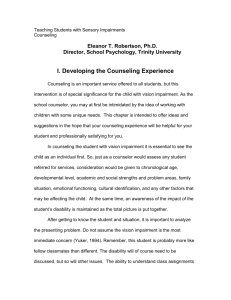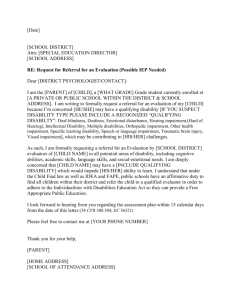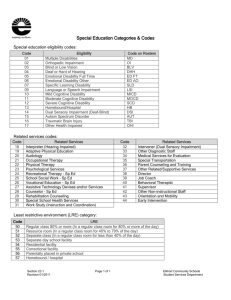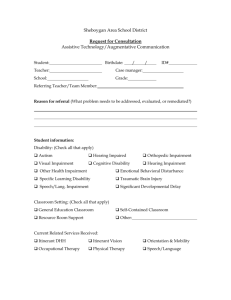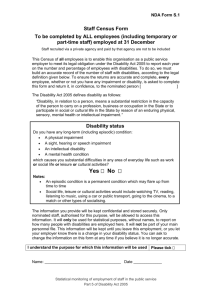Counseling Students with Hearing Impairments
advertisement
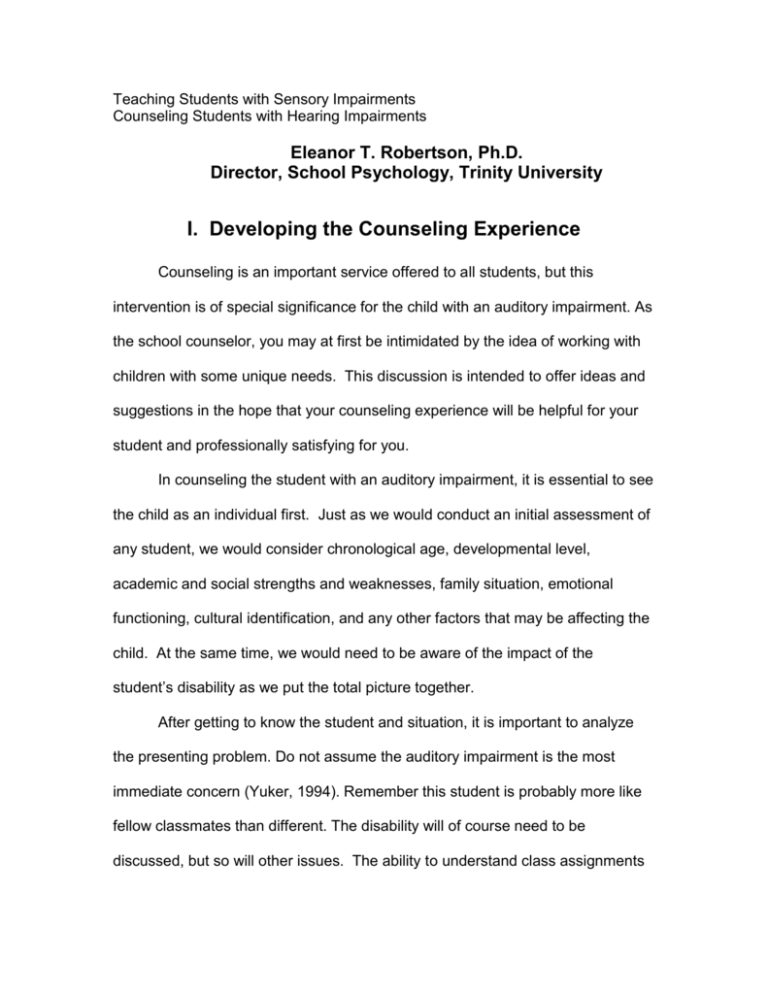
Teaching Students with Sensory Impairments Counseling Students with Hearing Impairments Eleanor T. Robertson, Ph.D. Director, School Psychology, Trinity University I. Developing the Counseling Experience Counseling is an important service offered to all students, but this intervention is of special significance for the child with an auditory impairment. As the school counselor, you may at first be intimidated by the idea of working with children with some unique needs. This discussion is intended to offer ideas and suggestions in the hope that your counseling experience will be helpful for your student and professionally satisfying for you. In counseling the student with an auditory impairment, it is essential to see the child as an individual first. Just as we would conduct an initial assessment of any student, we would consider chronological age, developmental level, academic and social strengths and weaknesses, family situation, emotional functioning, cultural identification, and any other factors that may be affecting the child. At the same time, we would need to be aware of the impact of the student’s disability as we put the total picture together. After getting to know the student and situation, it is important to analyze the presenting problem. Do not assume the auditory impairment is the most immediate concern (Yuker, 1994). Remember this student is probably more like fellow classmates than different. The disability will of course need to be discussed, but so will other issues. The ability to understand class assignments and the impact of the peer group on social functioning may be the most immediate topics. An important factor to consider in the counseling situation is your own theoretical perspective. How are you most comfortable working? Have you been most successful with behavioral interventions utilizing contingency contracts? Do you like to approach problems in a more cognitive manner, asking students to monitor their own “self talk?” Is “reality therapy” usually your first choice for teens? Are you most comfortable using the medium of play to explore problems with younger children? The approach with which you have had the most success is the one you should consider first. In addition to theoretical perspective, you will want to consider modality. Would the problem be best addressed with the child and yourself alone, or is this an issue with which the family could provide important support? Is this a social skill that a group of classmates also need to address? Or is this a problem specific to individuals with auditory impairments and students with similar concerns could be especially helpful? After assessing the problem and your approach, there are a number of issues that should be considered that are unique first to the child with any type of disability and a second group that are specific to the child with an auditory impairment. First, it is important to consider the child’s self-concept in relation to the auditory impairment. Olkin (1999) places individuals with a disability on a continuum from those who do not consider themselves as disabled, to those who identify as a person with a disability, to those who feel they are a part of the “disability community” and actively work for “disability rights.” Children whose parents are non-disabled typically are taught to act as “normal” as possible and identify with the non-disabled (Olkin, 1999; Sevigny-Skyer, 1990). While this may encourage behaviors that promote acceptance by the majority culture, it can also create serious self- esteem issues for the child who observes some differences from peers. Another reality that needs to be considered in counseling students with disabilities is the likelihood of additional environmental issues. Children with disabilities are more likely than the non-disabled to have more and longer hospitalizations, doctor visits, and school absences. Emotional and behavioral problems are more likely (Olkin, 1999). There is evidence that children with disabilities are at a higher risk for all types of abuse (Westcott & Jones, 1999). Additionally, families of children with disabilities are subject to more disruptions such as moving, financial problems, separation, or divorce of parents (Olkin, 1999). In counseling, keeping a systems focus is important (Kosciulek, 2004). The child with a disability must function simultaneously in a classroom, a school, a family, and a community. Attitudes of others in your school toward the student with a disability are critical. School-wide efforts to incorporate all students into the school environment can have an important positive effect. Encouraging interactions between the child with a disability and the non-disabled can encourage the positive adjustment of the student with an auditory impairment, so the “big picture” should be an important focus of your work. In addition to the general guidelines offered for working with the student with a disability, there are some unique considerations for counseling the individual with an auditory impairment. A summary of factors that should be considered is offered here with some specific suggestions for the school counselor that you may find helpful.
